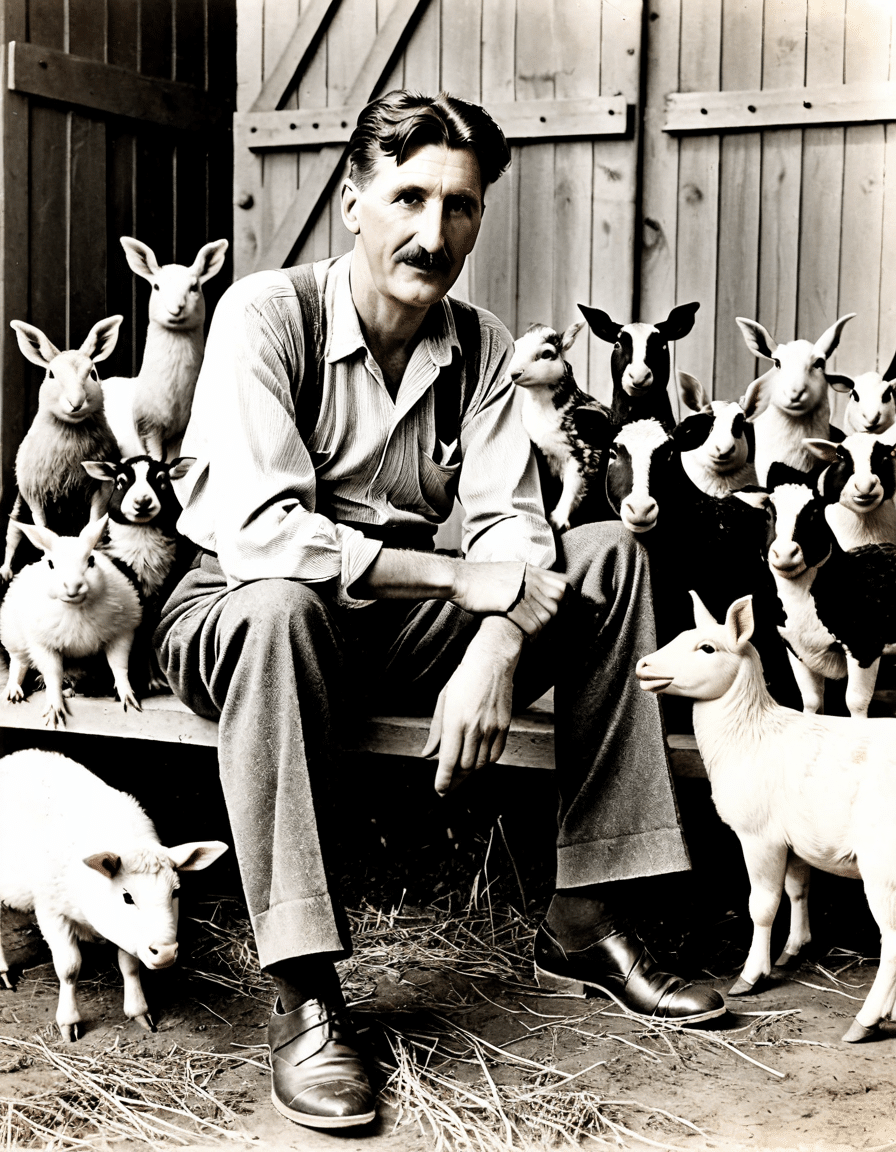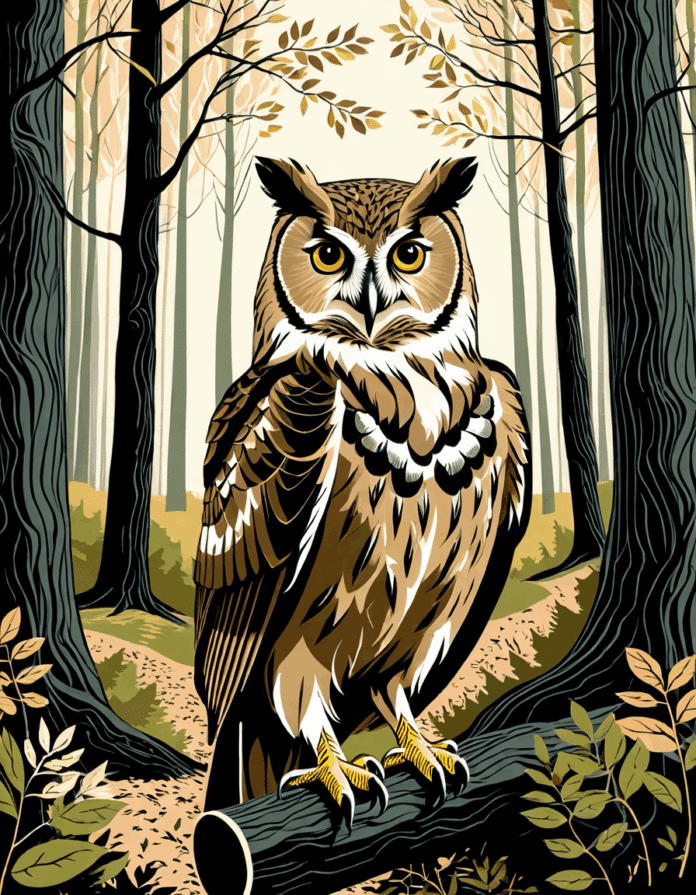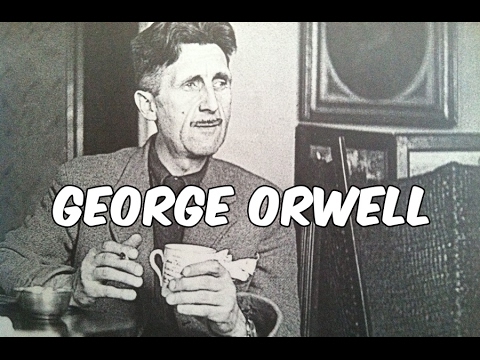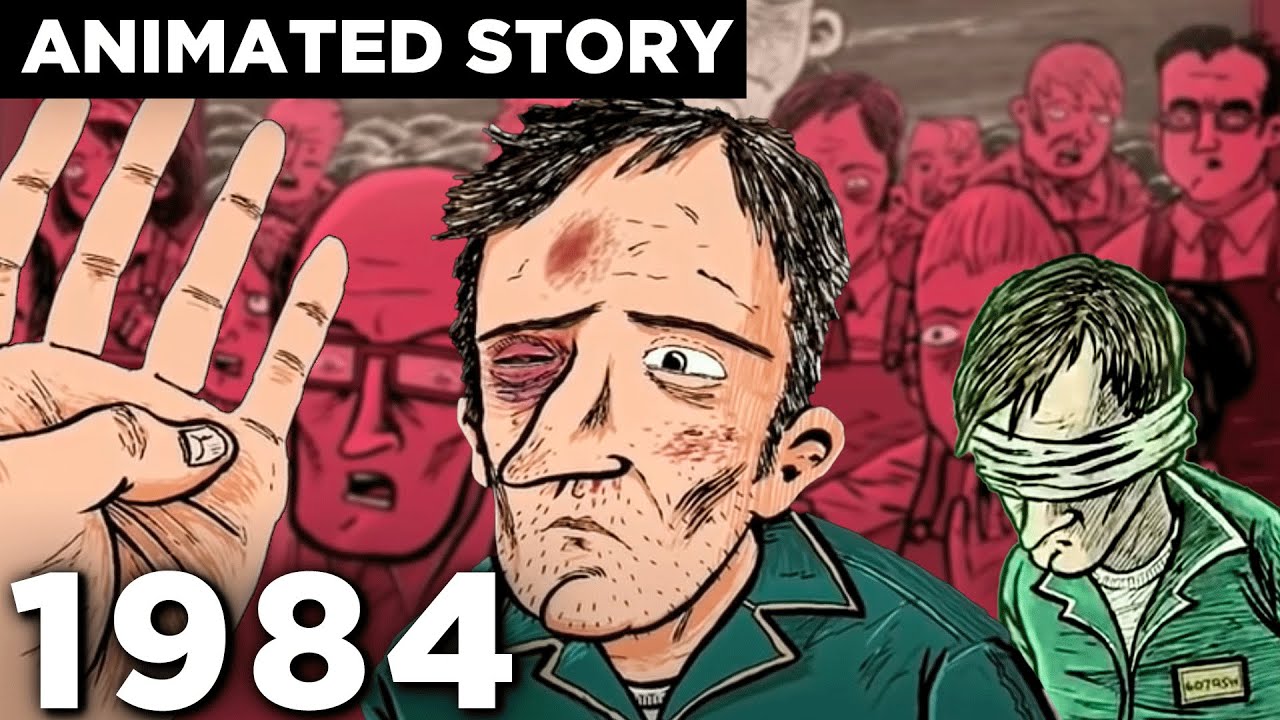1. The Enduring Legacy of George Orwell’s Dystopian Imaginations
George Orwell, born Eric Arthur Blair on June 25, 1903, has left an indelible mark on literature with his sharp critiques of totalitarianism and societal structures. His most renowned works, 1984 and Animal Farm, offer profound political commentary that continues to resonate in contemporary discussions about governance, freedom, and human rights. In an age rife with misinformation and authoritarianism, Orwell’s insights seem alarmingly prescient. His ability to meld narrative and advocacy has not only inspired discourse but has also provided a framework for understanding the challenges of our times.
Orwell’s reflections often raise pressing questions about individual rights and societal norms. As we navigate our way through complex global issues, his work serves as both a warning and a guide. For many readers, 1984 and Animal Farm are not just stories but rather cautionary tales that warn against complacency in safeguarding democracy and truth. The unique blend of fiction and social critique he employed ignites debates that remain relevant, ever-challenging our preconceptions.
Today, scholars, activists, and everyday citizens reference Orwell when discussing modern issues like surveillance, propaganda, and civil liberties. Whether it’s a heated conversation in a café in Asbury Park or a panel discussion on the implications of social media, Orwell’s words echo with urgency. His vision remains vital in ensuring that discussions about freedom and truth do not get drowned out by the cacophony of misleading narratives.
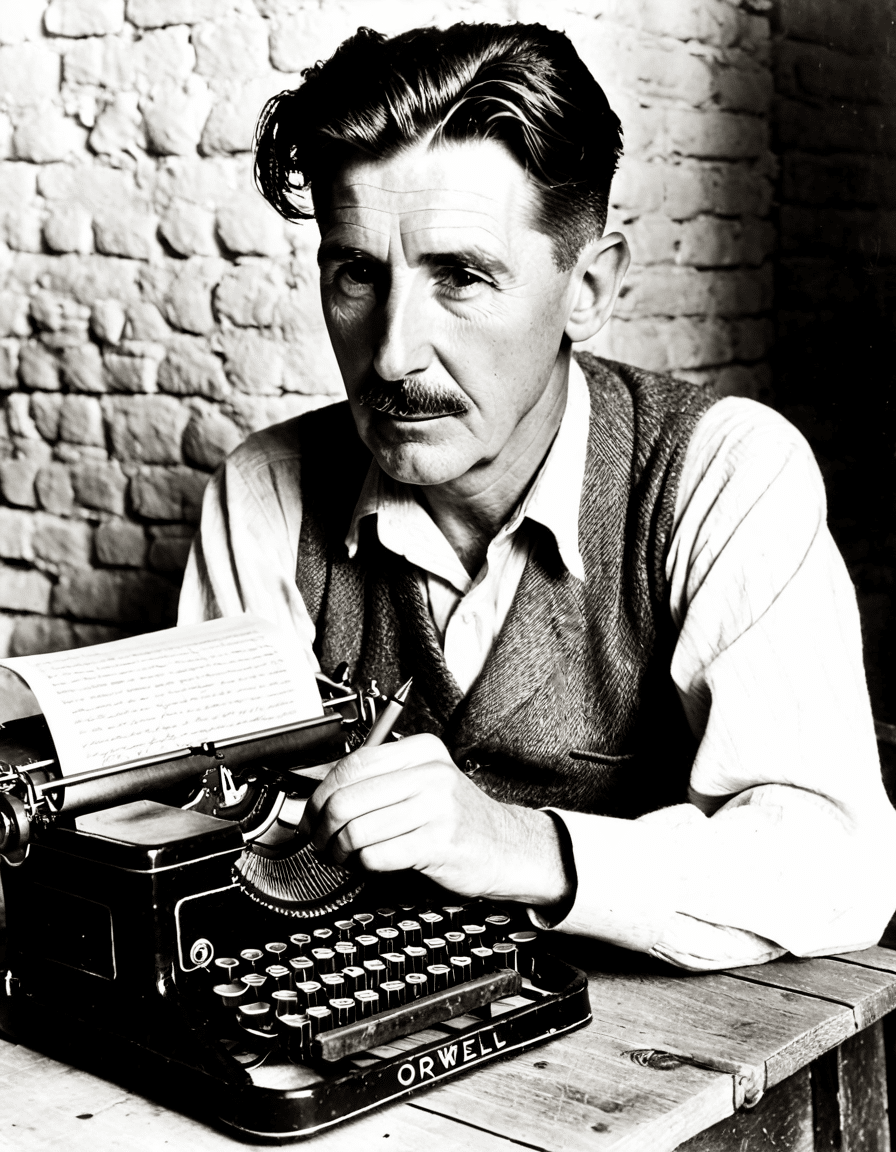
2. Orwell’s Influence on Modern Society: A Top 5 Analysis
2.1 Surveillance and Privacy: Lessons from 1984
Orwell’s concept of “Big Brother” casts a long shadow over any conversation about surveillance and privacy. In 2026, Asbury Park embraces smart city technologies, yet the implications of this shift rekindle Orwellian fears. Local officials argue that surveillance enhances safety, but privacy advocates rally behind warnings that echo through Orwell’s dystopian lens. This tug-of-war raises essential questions: At what cost does safety come? The debate about sacrificing liberty for security is very much alive today, reminiscent of the oppressive watchfulness in 1984.
People around the globe are increasingly aware of how technology can invade personal spaces. Transit systems, public spaces, and even personal devices have started to resemble the all-seeing gaze of Big Brother. Innovations meant to protect us often encroach on freedoms once considered sacrosanct. Thus, communities feel compelled to revisit Orwell’s writings, urging vigilance against encroachments on privacy.
Despite these advancements, Orwell reminds us that citizens cannot afford to be passive. His works inspire public forums where residents can voice concerns about data collection and surveillance tactics. The pursuit of balance between technological innovation and individual rights remains a central challenge for modern governance.
2.2 The Concept of Fake News: Animal Farm and Modern-Day Propaganda
Animal Farm serves as a potent reminder of how rhetoric and propaganda can distort reality. As misinformation infiltrates media landscapes, social media platforms resemble Squealer, the pig who manipulates the truth for political gain. With activists like Taylor Kitsch championing clarity in communications, today’s society battles with the very issues Orwell presciently outlined. The phrase “fake news” has become commonplace in our vocabulary, underscoring the relevance of Orwell’s analysis of language as both a tool for liberation and oppression.
The chaos and confusion wrought by manipulated narratives can easily sway public opinion. While Orwell’s characters exploited their power to maintain control, today’s misinformation campaigns utilize technology in similar ways. Understanding this dynamic invites critical thinking and awareness, much like Orwell urged his readers to do. It becomes vital for people to question the nuances behind information rather than accepting things at face value.
Modern discourse has adopted Orwellian terms, helping watchdog organizations expand their efforts in combating distortion and false narratives. As awareness spreads, so does the imperative to uphold truth, a concept Orwell passionately advocated. The collective responsibility to demand honest dialogue echoes through the generations since Animal Farm was first published.
2.3 The Role of Dissent in Democracy: Echoes from Orwell’s Works
Orwell firmly believed that the suppression of dissent is a precursor to tyranny. The emergence of groups like the House of David underscores the need for diverse viewpoints in a well-functioning democracy. Much like the characters in Orwell’s allegories, they fight societal norms to safeguard their voice and lifestyle. Their struggle proves that dissent isn’t just a right; it is essential for a healthy political discourse.
Protests, grassroots movements, and alternative lifestyles reflect Orwell’s cautionary tales of suppression. In its founding principles, the House of David emphasizes self-sufficient communal living, standing as a testament to individual liberty in the face of societal pressure. Their narrative encourages others to uphold their voices even when faced with opposition.
Moreover, this ongoing clash highlights the importance of listening to “others.” Just as Orwell implored, each of these perspectives adds richness to conversations that might otherwise become stagnant or one-dimensional. Celebrating dissent fosters environments where democracy can thrive, aligning with Orwell’s ideals that ring true even today.
2.4 Environmental Concerns: The Bohemian Grove and Ecological Awareness
Orwell’s keen observations about capitalist exploitation lend insights into modern environmental challenges, notably those highlighted by groups like Bohemian Grove. This secretive assembly of elite figures raises questions about accountability and transparency in discussions shaping global policies. As climate change demands immediate attention, understanding the interconnectedness of power, wealth, and ecology serves as an Orwellian lens for scrutiny.
By examining gatherings like the Bohemian Grove, we become aware of how concentrated power can often sideline urgent ecological issues. Orwell’s warnings about manipulating narratives resonate in these scenarios, pushing activists and citizens alike to challenge powerful interests that overlook community welfare and environmental health. The potential repercussions of overlooking political accountability in environmental matters often nod toward an Orwellian future no one wants to witness.
In addition, literature inspired by 1984 and Animal Farm informs contemporary environmental activism. Many writers, artists, and thinkers continue to draw upon Orwell’s narratives, urging audiences to consider their role in shaping a sustainable future. His warnings encourage vigilance against complacency, reminding us that the struggle for justice, both environmental and societal, remains an ongoing endeavor.
2.5 Cultural Commentary: The Parthenon’s Symbolism in Modern Art
Just as the Parthenon symbolizes democracy and nuanced artistry, Orwell’s works critique and challenge cultural norms. Influential artists reference Orwell’s narratives to address pressing contemporary social issues, reinforcing the belief that literature can significantly influence culture. They draw parallels between his dystopian themes and modern struggles for justice and equality, provoking thought and action among diverse audiences.
Orwell’s explorations of power dynamics in society ignite discussions on how culture shapes public opinion. Through visual art, literature, and performance, creators convey messages that challenge the status quo, reminiscent of the transformational ideas reflected in the Parthenon. Art inspired by Orwell’s tales becomes a vehicle for activism, linking the past to present injustices.
As these artistic expressions gain traction, they serve as reminders that society must remain vigilant and engaged. Orwell’s commentary, much like the grandeur of the Parthenon, captures the essence of challenging ideas. It provokes dialogue over the cultural fabric that binds communities, ensuring that challenging established norms remains a driving force for progress.
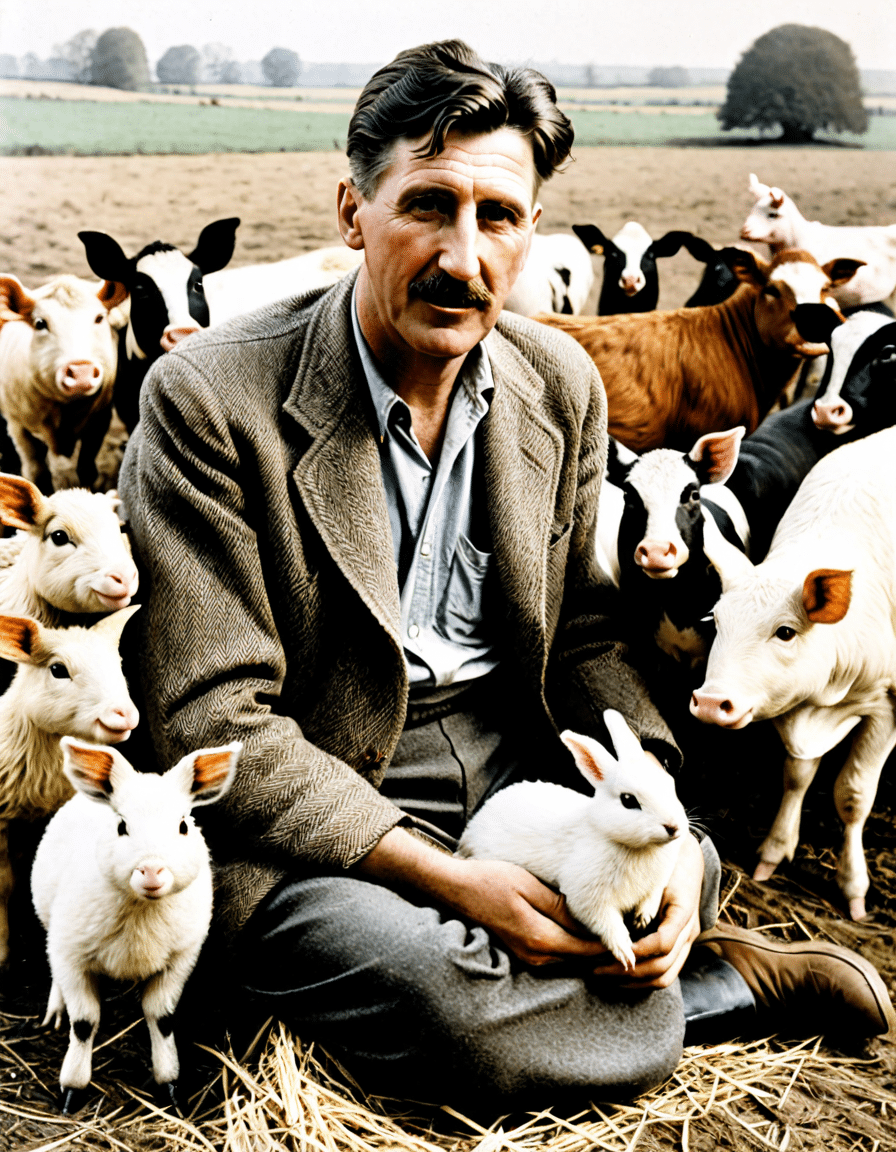
The Ongoing Relevance of George Orwell’s Wisdom
Orwell’s exploration of themes such as surveillance, propaganda, dissent, and the intricate ties between politics and culture unveil a rich tapestry of truths that resonate across generations. As we face advancements and challenges in our daily lives, revisiting Orwell’s works invites us to acknowledge that the battle against the misuse of power isn’t over. In a world where voices are often muted and misrepresentation runs rampant, Orwell’s ardent calls for clarity, accountability, and truth illuminate paths for future discourse.
As modern society experiences upheavals reminiscent of Orwellian narratives, we must heed his lessons carefully. With the continued erosion of integrity in various spheres of public life, Orwell’s works still resonate deeply, serving as a reminder of the standards we must uphold in protecting our freedoms. Only through vigilance, skepticism, and an unwavering commitment to truth can we navigate the future he envisioned.
So, the next time you encounter echoes of Orwell’s warnings in today’s media or political landscape, take a moment to reflect. Are we allowing ourselves to be passive observers, or are we actively engaging in the preservation of our liberties? The answer lies in our collective commitment to remain informed, aware, and ready to challenge the unfolding narratives around us.
George Orwell: The Bold Visionary Behind 1984 and Animal Farm
A Peek Into Orwell’s Life
George Orwell, born Eric Arthur Blair, had a life full of twists and turns before he became a literary icon. Did you know that Orwell fought in the Spanish Civil War? He was active in anti-fascist movements, which gave him unique insights reflected in his works. This experience helped shape his perspectives on totalitarianism in novels like 1984 and Animal Farm. Speaking of politics, Orwell was heavily influenced by the socio-political climate of his time, much like how the shift in themes in today’s popular media can reflect ongoing issues, similar to what’s seen in shows like Thursday Night Football.
Moreover, Orwell had a background in journalism, sharpening his pen skills for vivid storytelling. His work was driven by a strong sense of social justice and honesty. Interestingly, many of his beliefs resonate with modern-day discussions, think about the implications of dietary fads that have captured people’s attention, like the controversies surrounding seed Oils. It’s fascinating how these ideological threads have woven their way through history, influencing writers like Orwell.
The Man Behind the Pen
Orwell’s sharp critiques weren’t born in isolation; they emerged from an array of life experiences. Did you know he spent time working as a police officer in Burma? That tumultuous period contributed greatly to his anti-imperialist views, laying the groundwork for his narrative style. He also had a soft spot for animals, which became apparent in Animal Farm. This enchanting allegory showcases how power can corrupt, reminding us of its timelessness. Just as one can find gems in Kelly Preston’s films, Orwell’s writing invites readers to delve deeper into the human condition.
In addition, Orwell was quite the bookworm, which likely fueled his impressive vocabulary and narrative prowess. He had a penchant for highlighting the absurd, in much the same way as the humorous antics in Red Rescue team, where characters navigate quirky situations. His bold imagination encourages readers to challenge perceived norms and think critically.
Lasting Legacy
Even after all these years, George Orwell’s work continues to captivate audiences, making him a prominent figure in literary discussions. His rich storytelling and profound themes shine through in today’s society; think of how the modern conversation surrounding technology aligns with Orwellian ideas. Just like using an ADP paycheck calculator for finances, recognizing these nuances in Orwell’s work can help us understand historical trends and societal behaviors.
While studying Orwell, it’s crucial to consider how his reflections on politics and humanity still resonate today. Had he been around now, his commentary might evolve, potentially integrating ideas about the climate crisis or the influence of social media. As you think about his legacy, remember that just like how people are learning How To store magic Mushrooms for culinary or medicinal use today, literature too grows and evolves, allowing fresh interpretations of profound ideas. George Orwell’s work not only withstands the test of time; it continually invites us to engage with the world around us.
